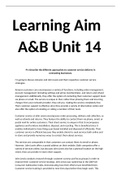Learning Aim
A&B Unit 14
P1: Describe the different approaches to customer service delivery in
contrasting businesses.
I'm going to discuss Amazon and John Lewis and their respective customer service
strategies.
Amazon customer care encompasses a variety of functions, including order management,
account management (including settings and prime memberships), and return and refund
management. Additionally, they offer the option of contacting their customer support team
via phone or email. The service is unique in that, rather than phoning them and incurring
charges from your network provider, they call you, making the service completely free.
Their customer support is effective since they provide a variety of alternatives online and
also offer the option of emailing or calling a member of their team.
Customer service at John Lewis encompasses order processing, delivery and collection, as
well as refunds and returns. They feature the ability to contact them via phone, email, or
postal mail for online customers. Their client service is unique in that it encompasses
appliance and furniture installation, disposal, and recycling. This is beneficial since it
enables individuals to have things purchased installed and disposed of efficiently. Their
customer service is efficient because they enable clients to seek services both online and
in-store and provide numerous ways to contact them about services.
The services are comparable in that customers can contact them via email or phone.
However, John Lewis offers a postal address on their website. Both companies offer a
variety of services online, but because John Lewis also has a physical location on the high
street, they can provide in-store client support.
John Lewis conducts research through customer surveys and focus groups in order to
improve their customer service strategy. John Lewis was ranked top in the 2009 UK
Consumer Satisfaction Index, demonstrating how their efforts have benefited them.
Customer service training is provided to new hires days before they begin work. This
, indicates their commitment to both client feedback and customer service.
Additionally, Amazon trains its employees to improve their customer service skills. They are
trained to listen as well as to speak. Additionally, they provide an easily navigable support
centre to address client complaints. Amazon is defined as a customer-centric firm,
demonstrating its effectiveness in customer service.
Both organizations take comparable techniques, such as educating personnel to boost their
effectiveness and collecting client feedback. There are few distinctions between the
approaches, as both are centered on easily accessible online support centers and well-
trained people available to address questions by email or phone.
I feel John Lewis provides the most effective customer service since they offer a variety of
services like as installation, disposal, and recycling and are consistently rated highly in
customer satisfaction surveys. This is a unique technique since it demonstrates their
commitment to the environment and fosters a sense of compassion by including them not
only in purchasing but also in the services associated with the product.
P2: Examine ways that customer service in a selected business can meet the expectations
and satisfaction of customers and adhere to relevant current legislation and regulations.
I will be discussing about John Lewis and how their customer service can fulfill the
expectations and happiness of the client as well as conform to applicable current rules and
regulations.
Some examples of expectations of John Lewis customer services would be rapid, efficient
and accurate service, polite and helpful staff to provide information and prompt responses
to inquiries. When client expectations are met by high-quality service being offered,
customer satisfaction is attained. The quality of service is decided by the expectations of
the consumer, since high-quality services that don’t satisfy expectations contribute to a
terrible service reputation. Bad service reputations then lead to a fall in demand since
there is diminished appeal to the product, negatively harming business. These are altered
by client personalities as everyone has distinct expectations leading to varied sources of
happiness.
Special criteria are needed by particular clients to achieve their expectations and in turn
satisfaction. For example, consumers less fluent in English may demand someone who can
speak their more competent language. The availability of language options will meet
particular requirements leading to the establishment of strong customer interactions as
consumers are completely understanding what is taking place during transactions and
don’t feel tricked by companies, fostering trust.
John Lewis and other firms have to follow legislation and regulations obliging them to meet
fundamental requirements. For example, the Consumer Protection Act 1987 protects




